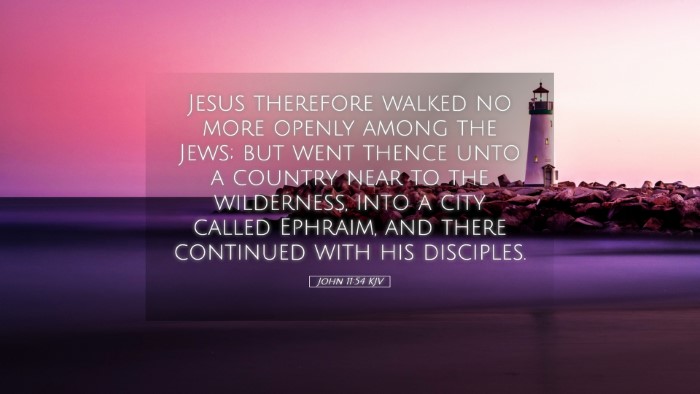John 11:54 states: “Therefore Jesus no longer walked openly among the Jews, but went from there into the region near the wilderness, to a town called Ephraim, and there stayed with his disciples.” This verse follows the dramatic account of the raising of Lazarus, a miracle that intensified the attention of the religious authorities and the populace. Jesus, aware of the mounting hostility against Him, takes deliberate steps to ensure His safety and the fulfillment of His mission.
Contextual Background
The narrative leading up to this verse is crucial for understanding the implications of Jesus’ decision to retreat. The resurrection of Lazarus not only displays Jesus' divine authority but also serves as a tipping point that leads to the conspiracy of the Jewish leaders to eliminate Him. The miracle garnered significant attention, resulting in increased opposition, leading some to believe in Him while others sought to destroy Him.
Insights from Public Domain Commentaries
Matthew Henry's Commentary
Matthew Henry notes that Jesus’ withdrawal from open ministry signifies His strategic response to the escalating threats against His life. By choosing to go to Ephraim, a town in Judea, He demonstrates an understanding of the political and religious landscape. This move allowed Him to continue His teaching in a more private setting, reinforcing the commitment to His disciples while evading danger.
Henry also emphasizes that Jesus’ retreat underscores His control over the situation. Rather than succumbing to fear, Jesus actively shapes the course of events leading to His crucifixion. Henry's reflections urge readers to recognize that divine purpose governs the path of Christ, revealing that even in moments of apparent retreat, there is a purposeful advance towards His salvific mission.
Albert Barnes' Notes on the New Testament
Albert Barnes provides further elucidation on the geographical significance of Ephraim, suggesting that Jesus’ departure to this region is symbolic of His isolation from the conflicts of Jerusalem. Barnes posits that this town represents a place of safety and contemplation, where Jesus could prepare His disciples for the impending climax of His ministry—His death and resurrection.
Barnes also points to the necessity of this withdrawal to showcase the temperance Jesus exercised. It serves as a pivotal moment that illustrates that His ministry was not merely about confrontation but also about nurturing His followers. He indicates that this decision mirrors the wise discernment that leaders, especially those in pastoral roles, must adopt in times of adversity.
Adam Clarke's Commentary
Adam Clarke discusses the implications of the phrase “Jesus no longer walked openly among the Jews.” He interprets this retreat as a marked shift in Jesus' ministry approach in light of the rising enmity. Clarke suggests that Jesus' physical withdrawal serves as an allegory for the spiritual withdrawal from those who reject Him. This indicates a turning point where open ministry transforms into a more discreet engagement with His true followers.
Clarke asserts the importance of location; Ephraim, mentioned here, can be seen as a place of refuge. He highlights that even in hiding, Jesus maintains His mission by being with His disciples, revealing a dynamic of mentorship that aspires to deepen their understanding and commitment. This provides a profound insight into pastoral care, demonstrating that true leadership often requires moments of retreat to recharge and refocus on one's mission.
Theological Reflections
The verse encapsulates profound theological truths about the nature of Christ's ministry. During His earthly mission, Jesus often engaged with the marginalized while simultaneously responding to rejection from those in power. His retreat to a quieter region symbolizes a transition from public proclamation to intimate discipleship, emphasizing the importance of spiritual formation over mere popularity.
Furthermore, this moment reveals God’s sovereignty in orchestrating the events leading up to the crucifixion. Jesus's actions exemplify how one can discern when to confront and when to withdraw, a lesson crucial for contemporary leaders within the Church. Understanding when to step back while allowing divine purposes to unfold is vital in ministry.
Conclusion
John 11:54 serves as a potent reminder of the balance that leaders must uphold between public and private ministry. Reflecting on the insights from Matthew Henry, Albert Barnes, and Adam Clarke allows us to see that Jesus’ choices were deeply interwoven with divine purpose. The implications for contemporary ministry are significant, offering guidance on how to navigate challenges while remaining true to one’s calling. As scholars, pastors, and students venture into the depths of Scripture, may they find both encouragement and challenge in the example set by Christ.


